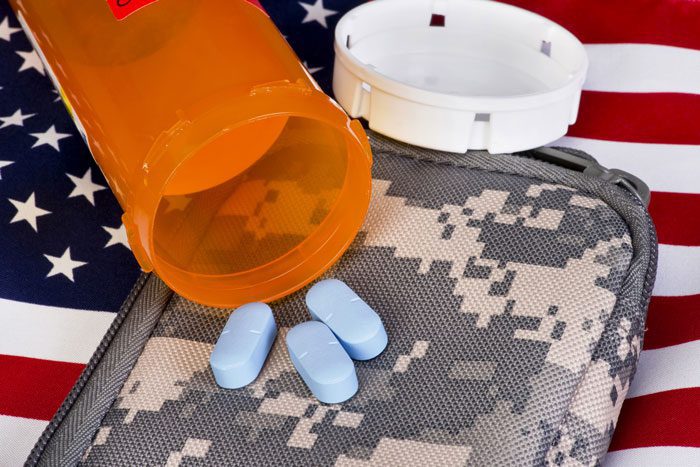 Substance use disorders do not discriminate.
Substance use disorders do not discriminate.
People of all ages, races, and socioeconomic backgrounds can struggle with drug or alcohol addiction. However, among those who are veterans of the armed forces, substance abuse is most often related to PTSD.
A Common Problem
Even though stigma makes many veterans reluctant to talk about mental health issues, substance abuse related to PTSD is quite common. According to the US Department of Veterans Affairs:
- 20% of veterans with PTSD also have a substance use disorder.
- 1/3 of veterans seeking treatment for a substance use disorder also meet the criteria for a PTSD diagnosis.
- About 10% of soldiers recently returning from Iraq or Afghanistan struggle with drug or alcohol abuse.
Women are the fastest growing group of veterans, but face additional service-related risks. They are twice as likely as men to develop PTSD and twice as likely to have other serious mental health issues. Additionally, one out of five female veterans reports being a victim of military sexual trauma.
Using Drugs and Alcohol to Self-Medicate
The Department of Defense has a zero-tolerance policy for drug use among active duty military personnel, which means that illicit drug use remains lower than rates in the civilian population. Alcohol and prescription drugs are the most commonly abused substances among active duty military and veterans alike.
Often, substance abuse begins as a way to self-medicate the symptoms of PTSD. Symptoms of PTSD include:
- Nightmares
- Flashbacks of events
- Triggers such as sights, sounds, or smells that cause you to relieve events
- Avoiding situations that remind you of the event
- Believing the world is dangerous and nobody can be trusted
- Feeling numb, detached, and/or hopeless
- Withdrawing from friends and family
- Having difficulty completing everyday activities due to symptoms
Being under the influence of drugs or alcohol can help PTSD sufferers temporarily relieve symptoms. For example, alcohol is a depressant that can make it easier to fall asleep if insomnia is related to nightmares or flashbacks. However, a tolerance to the abused substance develops over time and the addiction starts to create additional problems at school, work, or home. This creates a vicious cycle where substance abuse starts to take the place of activities and relationships that once were a source of pride, comfort, or joy.
Substance misuse also increases the risk of self-harm due to impaired judgment, poor coordination, and decreased problem-solving skills. Binge drinking or mixing alcohol and prescription drugs increases the risk of a fatal overdose.
Additional Risk Factors
In addition to a PTSD diagnosis, the following factors can place veterans at a high risk for developing a substance use disorder:
- Multiple deployments
- Traumatic brain injury
- Chronic pain due to combat-related injuries
- Loss of a friend in combat
- Lack of support from friends and family
- Previous mental health issues such as depression
- Believing in the stigma surrounding mental health and/or substance abuse
As with the general population, substance use disorders are highest among young people.
One report found that almost 25% of veterans age 18 to 25 met the criteria for a substance use disorder. This rate is more than double the rate of veterans age 26 to 54. It is five times the rate of veterans age 55 or older.
Promoting Lasting Sobriety by Treating Co-Occurring Disorders
Addiction professionals believe that the best way to promote a lasting recovery is to treat co-occurring disorders simultaneously. Failing to address PTSD symptoms while treating substance abuse greatly increases the risk of relapse.
Each VA medical center has a SUD-PTSD specialist on staff who can provide information about treatment options and the best way to support a lasting recovery. For example:
- Cognitive Behavioral Therapy (CBT) focuses on changing the way the veteran interprets specific thoughts, feelings, situations, and behaviors.
- Cognitive Processing Therapy (CPT) works on developing the skills to challenge or question problematic intrusive thoughts.
- Prolonged Exposure (PE) involves slowing facing triggering situations instead of avoiding anything that can bring back thoughts of past trauma.
- Couples therapy with a spouse or significant other strengthens a veteran’s social support system.
- Medication helps to manage specific symptoms of PTSD or a substance use disorder.
Outside the VA health system, there are a number of treatment centers that can offer a full continuum of care customized to fit the specific needs of individual veterans. At Waypoint Recovery, we provide evidence-based treatment for drug and alcohol addiction as well as any co-occurring mental health disorders.
Although PTSD and substance use disorders are both considered chronic conditions that can’t be cured in the traditional sense, they can be effectively managed so a veteran is able to live a full and productive life. Help is available, so there is no reason for a veteran to suffer in silence.





